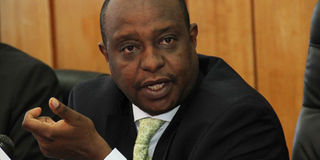KRA to publish list of items exempted from VAT

National Treasury Cabinet Secretary Henry Rotich during a joint media briefing at The Treasury on September 4, 2013. PHOTO/DIANA NGILA
What you need to know:
- Unscrupulous traders had taken advantage of implementation of the VAT Act to raise prices of exempted commodities
- Implementation of the VAT law that has seen prices of basic items and goods including foodstuff go up by a huge margin
The Treasury and Kenya Revenue Authority will publish the tariff on all commodities exempted from Value Added Tax.
National Treasury Cabinet Secretary Henry Rotich agreed with MPs that unscrupulous traders had taken advantage of implementation of the VAT Act to raise prices of exempted commodities.
"The challenge came about when we started implementing the law and the business people took advantage to raise prices yet it is clear which ones are exempted. KRA will start clarifying it tomorrow. There is need for clarity because as it is, there is a misrepresentation of the law,'' Mr Rotich told the MPs in Mombasa.
MPs protested vehemently to Mr Rotich over implementation of the VAT law that has seen prices of basic items and goods including foodstuff go up by a huge margin.
The Cabinet Secretary was responding to MPs questions after making a presentation on the budget process from the executive's perspective, with emphasis on timelines.
Meanwhile, the Finance, Planning and Trade committee says it will conduct a survey to ascertain the legality of the price increase on basic products and its relation to VAT.
Speaking at the sidelines of an induction workshop at at the Leisure Lodge Resort in Diani, Kwale County, chairman Benjamin Langat, said the committee work with other interest groups including KRA in conducting the survey.
“We are going to have a meeting as soon as the House reconvenes to strategise the way forward. Traders should not take advantage of the public to increase prices of basic commodities. It is not only illegal but also immoral,” he said.
According to Mr Langat, all basic and unprocessed food items were zero rated but some unscrupulous business people still decided to take advantage and increased their prices.
“Immediately after the passage of the VAT Act, issues emerged include the unprecedented increase of prices. Some traders decided to increase the prices of commodities beyond the recommended rate up to 40 or even 50 per cent,” said Mr Langat.
He said with the tax of 16 per cent, prices of commodities should not have increased by more than five per cent of the initial cost, including newspapers which he said raised their prices by up to 20 per cent.
Mr Langat said although the country had moved away from the price control system, it still aimed at improving the overall cost of doing business with the hope that other business men will follow suit.
CONSTITUENCY DEVELOPMENT FUND
Mr Rotich also promised MPs that Treasury would disburse from Wednesday the Sh2.4 billion balance for the Constituency Development Fund which would be paid within a three week period. He asked the CDF management to ensure a good cash plan is in place.
The Cabinet Secretary said he would immediately look into the reasons why money was yet to be released to pay staff and buy furniture for constituency offices.
Mr Adan Keynan, a member of the Parliamentary Service Commission said although PSC had factored it the budget, Treasury was yet to pay up. He asked Mr Rotich to ensure that money to pay staff is released on a monthly basis instead of the current three months.
Mr Rotich said his ministry "always gave priority to salary disbursement'' adding he would check whether PSC had made the acquisition request or whether it is stuck with Treasury.
The MPs had complained passionately about their inability to run their constituency offices due o lack of money to pay staff and purchase furniture.





